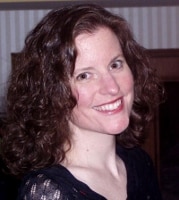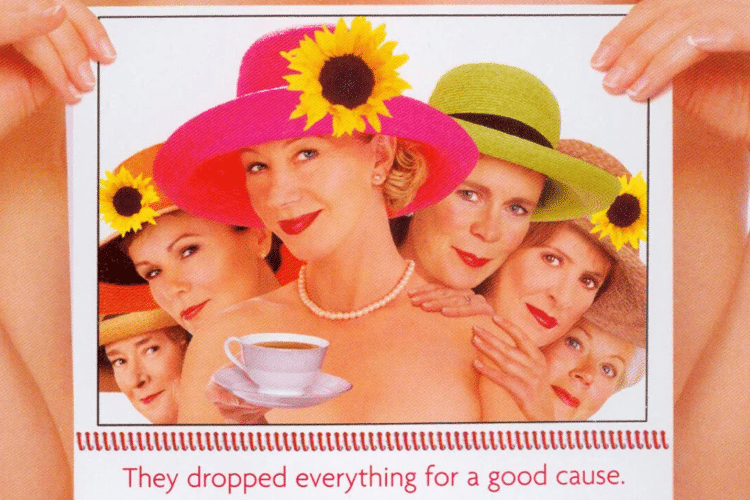Live Nude Women…of a certain age
Main Cast: Helen Mirren, Julie Walters
Director: Nigel Cole
Calendar Girls (2003) tells the story of Annie (Julie Walters) and Chris (Helen Mirren). The two are longtime best friends and members of their local WI (Women’s Institute) at which they are bored silly by the rotating litany of insipid speakers and dull projects. When Annie’s husband John (John Alderton) becomes seriously ill, the women spend countless hours in the hospital “relative’s room”. After deciding that the couch in said room is horribly uncomfortable, Annie wishes aloud that they could provide a new one. Chris, apparently being the instigator of plots and plans, spies one of those infamous nudie calendars at the mechanics and hatches a scheme. What if the yearly calendar for their chapter of the WI was a pin-up calendar? Not featuring the usual array of young things draped on motorcycles, but featuring instead the women of WI themselves? Of course there are hundreds of reasons why not, and the film sets about telling us of the women’s journey to become Calendar Girls.
The movie is based on actual events and has the undeniable feel of an “against all odds” type story. One that was absolutely ripe to be captured on film. This doesn’t necessarily play to the detriment of the film, but the formulaic aspects of the real story that make it such good movie material also take the edge off the tale, leaving the story fairly predictable. The fun is not necessarily in any surprises as to how things eventually happen; it’s in watching the women relish them as they do. The film is a touch long, taking a bit too long to reach the final scenes. The final twenty minutes or so found me watching the clock a little.
Helen Mirren and Julie Walters bring great warmth to Chris and Annie. Their performances are the backbone of the film, helping along the genuine feeling of grief over the illness of a loved one as well as infusing much of the gentle humor into the film. The women who pose for the calendar are a diverse lot, all modest and shy about the project, but determined to see it through. As the project begins to gain unexpected (but entirely predictable to the audience) momentum, the women are swept along – perhaps losing sight along the way of what they set out to do. Or perhaps not. The film isn’t some black and white indictment of the women as they become carried away by their own popularity. It’s a simple rendering of the pitfalls of sudden notoriety as experienced by a group of middle aged English women in a most unusual situation. The women are delighted, awed, baffled and in some cases tormented by their own dedication and success.
The film itself is filled with simple, easy humor and simple, easy conflict. Nothing too weighty, the film is definitely a light comedy. Annie’s grief feels real, but isn’t dwelled upon. The hardships that befall some of the other women during the course of the film are dealt with in a similarly earnest but brief manner. The comedy is never biting or uproariously funny, rather situationally amusing and more sweet than anything else. It’s just that kind of film. Light and fun, but without much emotional resonance or many real laugh out loud moments. Credit must be given to cinematographer Ashley Rowe for his beautiful shots of the English countryside. From the lovely small English town to the gaudy excess of LA, he captures some marvelous outdoor shots. He also does a wonderful job with the calendar shoot itself, a masterful piece of modesty and pride. The DVD includes a featurette with interviews with the real calendar girls, as well as a segment in which the director (Nigel Cole) discusses the pitfalls of filming the calendar shoot.
So this sounds like a very middle of the road film, doesn’t it? Enjoyable without demanding a lot of emotional investment. Funny without being caustic or edgy. Just a nice little movie. Probably worthy of a three star rating. But it isn’t going to get that from me. It’s getting four, and maybe deserves five. Calendar Girls as a sweet story with gentle humor and undemanding pathos is one thing. Calendar Girls as a film that the women (and men) of this country desperately need places it in a category quite apart from other “light comedy”. The fact is that Calendar Girls depicts something that is rarely if ever seen in contemporary film. Real nude women.
Now before the wails of protest about the abundance of female nudity in film begin, let me explain. There is certainly more than enough skin on the big screen. The difference here is just who that skin belongs to. Over the past couple of years we have seen at least two very high profile movies in which middle aged women in the nude have been played as jokes. In Something’s Gotta Give we have a trailer in which Jack Nicholson appears to recoil in horror from the sight of a nude Diane Keaton (a fact not played out in the film, but amply played up in the marketing). In About Schmidt we have Jack Nicholson again recoiling in horror from the sight of a nude Kathy Bates. We hear things like “For a woman of her age, Keaton looks pretty good” and “Bates is brave to do that nude shot”. We never hear that these are beautiful women. Why is that? It’s because they aren’t under the age of twenty five and don’t have perfect, airbrushed, siliconed, liposuctioned bodies. They are real women and for that they are not applauded (unless it’s for their bravery in revealing their unfortunate physicality to the masses), they are at best pitied for their imperfection and at worst scorned and ridiculed for the same.
Calendar Girls never once goes this route. Not. Once. The women are insecure about appearing nude, as any woman would be had they never been in that situation before. Even the actresses are nervous, feeling the pressure of not being perfect or barely legal. But they do it. And they do it with guts and a kind of giddy pride that totally belies the societal dictum that middle aged women can’t be beautiful and shouldn’t be appearing on screen (or on a calendar) nude. I’m not privy to the societal pressures English women feel about their bodies. But in this country, once a woman reaches a certain age, or is blessed with the marks of childbirth or any other perceived imperfection, it is her sworn duty to keep her body out of the public eye. We’ve all seen it, most of us have done it – ridiculed the woman on the street for wearing the shorts that show off a stretch mark or a varicose vein. Cringed at the sight of an older woman in a swimming suit. We’re programmed to value youth and impossible perfection above all else. Even though deep down we know this is all a fashion magazine lie. Nobody is perfect, yet we are all expected to be. And we expect it from ourselves. How many of us are constantly on a diet, constantly looking for something to erase a tiny wrinkle or roll back the years so that we might look like that pinup girl? We are a youth and perfection obsessed culture with a skewed idea of what is beautiful.
Calendar Girls is the exact antithesis of this cultural nightmare. These women are not perfect. They are not impossibly young, nor impossibly, surgically taut. As the character of John says in the movie, “The flowers of Yorkshire are like the women of Yorkshire. Every stage of their growth has its own beauty, but the last phase is always the most glorious.” These women, hesitant and modest at first, begin to revel in the beauty that is theirs by right. The beauty they have earned through a lifetime of experience. The beauty of a woman being herself and loving it. We so very rarely see examples of women not “accepting” their aging bodies, but proud to be who they are, that this film comes as a fragrant and lovely breath of fresh air in a stultifying and claustrophobic environment of unrealistic body expectations. Watch these women, these actresses. Watch how they find joy in their physical selves that they thought was gone forever. Look at the calendar pictures and try to deny that they are, in a word, beautiful. In particular, look at the series of shots of Helen Mirren with the apple press. She is the very picture of strong, confident, beautiful, sexy. With every imperfection on display, she’s fabulous. There is as sequence in the DVD extras where the photographer discusses the still shots he took for the calendar depicted in the film. He is a young, handsome man, full of appreciation for the lovely women he had the opportunity to photograph. This appreciation shows in each photo in the calendar. These women are old (ish), nude and fabulous.
We need this movie. We need it to show us that women “of a certain age” need not hide. That they can and are every bit as beautiful as their younger, more surgically altered counterparts. We need it to show ourselves that we need not feel that age and beauty don’t mix. We need it to help us overcome a culture of impossible standards and years of fighting to be something that the vast majority of us will never be. We need Calendar Girls to help us look at our partners, our friends, ourselves and understand that we are beautiful, that “every stage of growth has its own beauty”. That we needn’t find shame in age where there is none. We all need to be Calendar Girls, at least in our own minds. While I doubt that director Cole or writers Tim Firth and Juliette Towhidi set out to make a film that so perfectly illustrates a concept American women – and men – need to see (over and over if possible), they have done just that. This is a film worth seeing, not just for its gentle humor, but also for its unabashed appreciation for the human body just as it is, not “fixed” until its “perfect”. We owe it to ourselves. We owe it to our daughters. This film has a lot to teach us, if we are willing to listen. And that is some fine accomplishment for a “light comedy”.

Sue reads a lot, writes a lot, edits a lot, and loves a good craft. She was deemed “too picky” to proofread her children’s school papers and wears this as a badge of honor. She is also proud of her aggressively average knitting skills She is the Editorial Director at Silver Beacon Marketing and an aspiring Crazy Cat Lady.







Leave a Reply